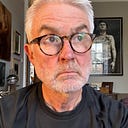Late call: married at last

In Angus Wilson’s 1964 novel, Late Call, Ray, the grandson of its hero, Sylvia Calvert, is a gay man. Wilson was one of Britain’s first openly gay writers. I was 14 when the novel was serialised on television in 1975.
One scene, in particular, left a lasting impression on me because it was so rare in those days. In it, Ray is dancing in the living room of the family home with another man. In my memory at least the room is dimly lit as if nobody should be looking. I remember watching that scene with my mother and father and squirming inside — knowing that it was something which shouldn’t be commented on, but also realising that it was somehow about me.
Later that same year just how it was became much clearer when a new boy at school walked into the games changing rooms one lunchtime. For me, it was a moment of instant attraction. For him, there was no moment, only unknowing. My subsequent crush was long and, of course, unrequited.
There were no words for any of this and even if there had been it was entirely unspoken. But it was how I learnt who I was and who I was not. I went on to have a series of encounters with girls even though I knew from the very beginning each time that they wouldn’t last. And they didn’t.
In time, it became clear that I was to take Robert Frost’s ‘road less traveled by’ which would involve a different kind of life. One of opportunities and possibilities for sure and none of which I regret. But one which would of necessity eschew convention, not the least of which would be marriage.
By the 1980s, I was a young gay activist campaigning for rights but not for marriage. It wasn’t in vogue back then. We were in search of a different way of life. We were not for changing normal but rather for rejecting it altogether.
As late as 1995 when the gay conservative political commentator, Andrew Sullivan, argued for equal marriage in his book, Virtually Normal, my priorities lay elsewhere. As much as anything I think by then I had found a different way of being. My inability to marry had become an accustomed absence. And I was also already a de facto widower.
Fast forward thirty years and I am met with a different encounter in a changing room at a gym. This though is a moment of knowing. I have seen the man once before. He has an unforgettable twinkle in his eye. This time I am going to speak to him. And I did. It took me an extra forty lengths in the pool mind and I really don’t like swimming.
Today, 12 years later, the man with the twinkle in his eye and I are going to a wedding. Our wedding. We are getting married. He is going to be my husband and vice versa. All this is possible because in the end changing normal rather than subverting it became irresistible.
And because we won the right to marry, we will do so in the splendour of Lothian Chambers in our home city of Edinburgh. Not by accident, we will own the civic space for an hour. It will be an intimate ceremony but no less special for that, not the least of which is because neither of us ever thought we would marry.
My husband to be is a borderer who also took the road less travelled when he moved to Edinburgh from Hawick in the early 1980s. He wasn’t an activist back then but the sacrifices he made were no less significant.
Perhaps the most poignant of these for me even though it happened long before I knew him is that he never had the opportunity to have his name put forward to become the common riding cornet. That would have meant having a lass. And, in his words, being untrue to himself and his fellow Teries. It is the mark of the man I am marrying that he has remained steadfastly loyal to his town.
Marriage is a late call for both of us. Taking the road less travelled did make ‘all the difference.’ But today in middle age we will celebrate our ability to do the same thing as everyone else.
They say all things come to they who wait. It seems they are right.
And today was worth waiting for.
First published on 31st May 2017
